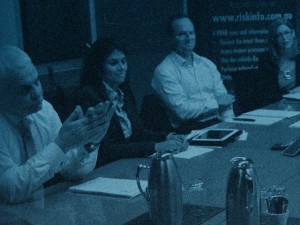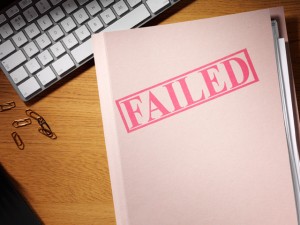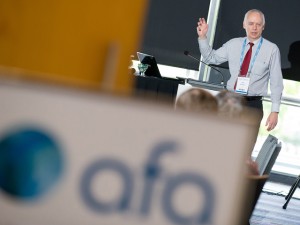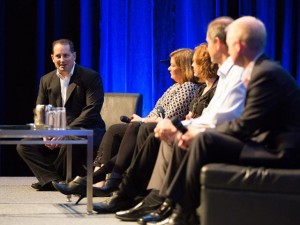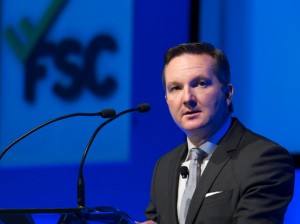Much is made of the gender gap in financial services, but why is it important to increase the number of female financial advisers? Guest journalist, Penny Pryor, talked to some of the semi-finalists in this year’s AFA Female Excellence in Advice Award to get their thoughts…
The reason why we need to get more women working in financial advice and planning is simple.
Not only do they represent less than one-fifth of the industry, at conservative estimates, but female clients often report they feel more comfortable sitting down with a woman to talk about their financial affairs.
Women don’t have a monopoly on empathy, but they do have qualities that help them relate well to clients.
So if we want more women to seek advice, then we need more women financial planners to do business with them.
And just like any profession with an overrepresentation of one particular gender, it stands to benefit from an evening out of that imbalance.
The semi-finalists in the 2014 AFA Female Excellence in Advice Awards, a joint initiative of the Association of Financial Advisers and TAL, with support by Macquarie Graduate School of Management, have plenty of ideas about how to get more women into the industry.
And they are more than willing to play a role themselves, whether that be through mentoring, promoting financial literacy and education, or just taking the time out to explain the profession to career advisers.
“I’ve got a friend who is a career adviser and she still thinks that what I do is sit down and run numbers all day,” Dominique Bergel-Grant, of Leapfrog Financial, says.
The industry has a responsibility to better educate the community, but it is heartening that the best women in the field are more than willing to put their hands up to encourage more females into the fold.
Their suggestions cover education, career transitions, flexibility and mentoring…

Left to right back row: Dominique Bergel-Grant, Katherine Hann, Nadia Cassidy, Adrienne Rush, Kate McCallum, Silvia Damiano (facilitator), Shu-Yi Schulstad, Left to right front row: Sarah Riegelhuth, Julia Schortinghuis Missing: Naomi Rosenthal
Education
When asked about strategies to boost female representation, Adrienne Rush of Bendigo and Adelaide Bank says that it’s all about education.
“It’s really about educating women out there who may be interested in getting into financial planning,” she says.
“I think raising awareness is really important, and doing that through education.”
Like Bergel-Grant, she doesn’t believe that many people actually understand what financial advisers do, and the qualities and skills that women can bring to the profession.
Rush is a big advocate for bringing financial literacy and education into high schools and even universities. She says more students need to be made aware of it as a career option.
“I think it’s up to all of us to get out there and to do that [education],” she says.
Balance is important in any career but perhaps even more so for women
Then there is also the need for ongoing education once you’ve joined the industry and knowing that, just like any profession, you become better at it with experience.
“Hone your skills, get to know your craft, and get to know each piece of the advice world one step at a time… it’s so broad,” Bergel-Grant says.
And don’t be afraid to ask for help, for at its base it is a collegiate industry.
“I’ve never had anyone say, ‘No I won’t give you information,’ or ‘I won’t help you’,” Katherine Hann of Alan Donald Financial Services, explains.
Career transitions and quotas
Kate McCallum of Multiforte Financial Services came to financial planning later in her career, as did Hann.
Both of them turned 40 before they joined the industry. McCallum says there is a huge opportunity to attract people from other professions and industries into financial planning and that older women may be better able to relate to an older clientele.
“If we look at matching the people who are in higher need of advice, they’re going to be people who are 45 plus,” she says.
Hann became a financial planner at 47 when she realised that a combination of her different skills, developed from a variety of professions and industries which included science, gelled perfectly into an ideal career as a planner.
At the other end of the spectrum, Gen Y financial planner, Sarah Riegelhuth of Wealth Enhancers, says if we want to see more women in leadership in the profession we need quotas or recommendations at the top of companies and associations.
“This is what we need to do,” she says.
“It’s the simplest way to normalise seeing women as leaders and then by doing that, you’re creating opportunities, because you have to.”
Flexibility
Just like any other profession, financial planning can be as busy as you want it to be, but unlike other jobs, it can also offer flexibility. This can be particularly appealing to women who want to start a family, or already have children.
“This is actually a very, very friendly industry to do all of those things in,” Bergel-Grant says.
And contrary to the misconceptions of Bergel-Grant’s career adviser friend, it is an industry that is well suited for people who like having conversations and talking with people.
Balance is important in any career but perhaps even more so for women.
it’s vital for you to find and be your authentic self
“A lot of women in general feel they have to be all things to all people and it’s about finding that balance between the work you love, the family you have, and the time that you need for you just to recharge,” Hann says.
Mentoring and support
Providing mentoring, in both formal and informal settings, is another way that the industry can continue to support women.
Nadia Cassidy of Mercer Financial Advice has mentored a number of women and says it’s important to be aware of the other women in your professional life.
“The women that I mentor are people I’ve met socially, through university, through many other different avenues, and I’ve helped three of them become advisers,” she says.
As well as informal mentoring, there are also formal programs run by associations like the AFA.
Naomi Rosenthal of Tudor Investassure credits such a program for her success.
“Formal mentoring programs are so essential,” she says.
“For me the one thing I would advise is to get a great mentor… you need people around you to help support you and to help you grow.”
And men have a role to play too.
“We can’t ignore that there are so many men out there who are so passionate and so willing to want to see women grow in this industry,” Rosethal says.
Julia Schortinghius of Lighthouse Capital says that it’s important to look at the women in the industry who perhaps might be in administrative roles but would thrive in para-planning or financial planning.
“There’s an enormous opportunity within the industry already,” she says.
“As business owners, as an industry, and through industry bodies, I think there’s a lot we can do to help that journey and help that progression.”
Then, once people are in the industry, the right support network needs to be in place so they can understand the culture of what the industry is all about, Bergel-Grant points out.
Celebrate differences
Nobody likes to pigeonhole, but it is important to recognise and understand the different approaches that women have to leadership in terms of style.
Shu-Yi Schulstad of InsureWealth Financial Services & Consultancy points out that women will often have different solutions to men.
These differences need to be celebrated within the profession, and not looked upon as weaknesses, which would go a long way to creating a female-friendly industry.
“If we can bring that awareness to both female and male advisers I think that would be the first step to implement strategies that would attract more female advisers,” Schulstad says.
Women financial planners, or those looking to get into the industry, should also embrace who they are and what they can bring to the industry.
“People and clients connect with you because of who you are. To me it’s vital for you to find and be your authentic self,” Rosenthal says.
And if the passion and the enthusiasm of the semi-finalists in the AFA Female Excellence in Advice Awards is even just a little bit contagious, then the ratio of women to men is surely set to even out over the coming years.
Winner announced
 At the AFA’s National Adviser Conference, held in Cairns during October, Kate McCallum was named the winner of this year’s Female Excellence in Advice Award. Riskinfo congratulates Kate and all the finalists in this year’s awards.
At the AFA’s National Adviser Conference, held in Cairns during October, Kate McCallum was named the winner of this year’s Female Excellence in Advice Award. Riskinfo congratulates Kate and all the finalists in this year’s awards.
For more highlights from the Conference, click here.

Penny Pryor is a freelance finance reporter with 15 years’ experience writing for and editing financial publications. She has edited the Money section of The Sun Herald/The Sunday Age and was deputy editor of AFR Smart Investor.
The Female Excellence in Advice Award is a joint initiative of the AFA and TAL, and is supported by the Macquarie Graduate School of Management, who this year hosted a two-day masterclass in leadership for the nine semi-finalists. The Award recognises women in financial advice who are making a significant contribution to their profession, their community and their clients. TAL is an active promoter of positive change in the financial advice sector, encouraging more women to enter the industry and to take leadership roles.

